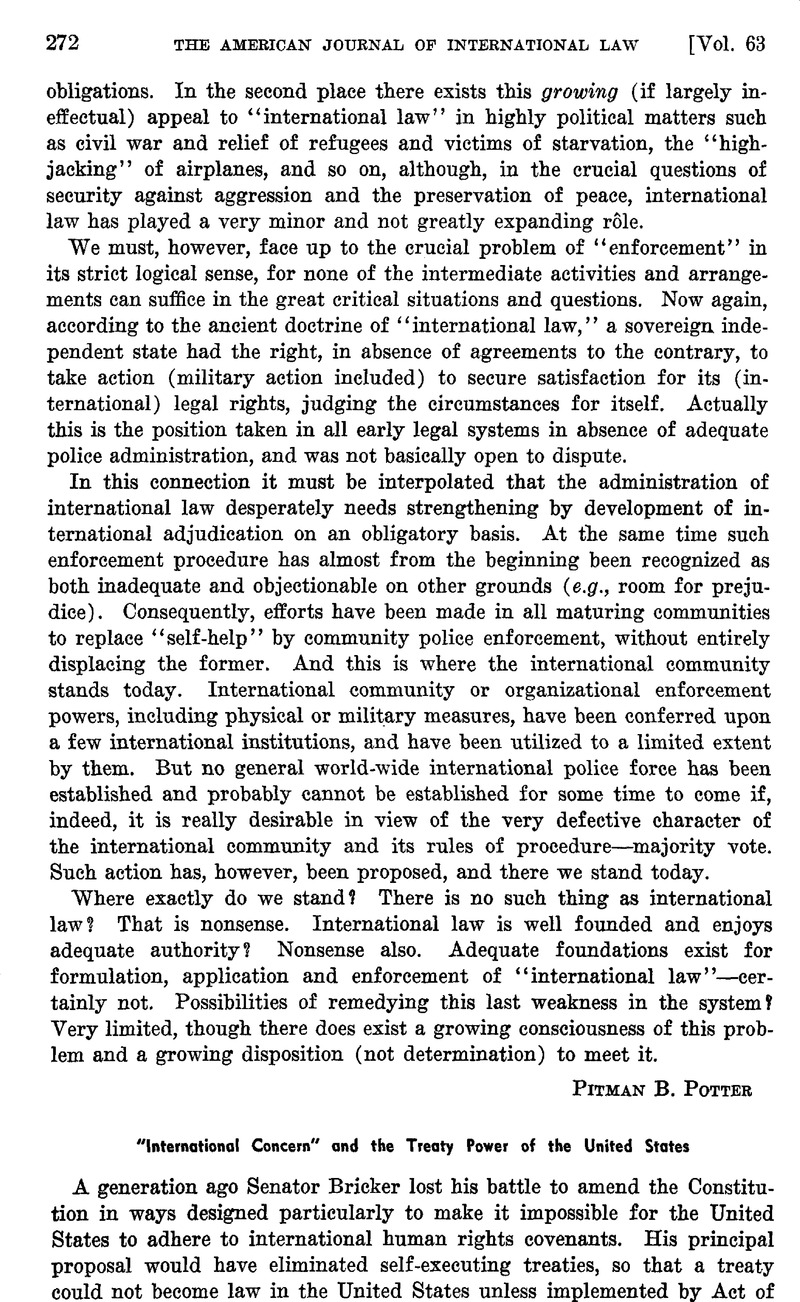Published online by Cambridge University Press: 28 March 2017

1 See, e.g., Henkin, , ‘ ‘ The Treaty Makers and the Law Makers: the Law of the Land and Foreign Eelations,” 107 U. Pa. Law Rev. 903, 933-935 (1959)CrossRefGoogle Scholar.
2 Compare, e.g., Heart of Atlanta Motel v. United States, 379 U. S. 241 (1964); Katzenbach v. McClung, 379 U. S. 294 (1964); Jones v. Alfred H. Mayer Co., 392 U. S. 409 (1968).
3 See, e.g., MacChesney, “Should the United States Ratify the Covenants! A Question of Merits not of Constitutional Law,” 62 A.J.I.L. 912 (1968), and materials there cited. I, too, joined the debates on that assumption. See Henkin, , “The Constitution, Treaties, and International Human Eights,” 116 U. Pa. Law Rev. 10–12 (1968).Google Scholar I am now suggesting a position going beyond the one assumed there.
4 1929 Proceedings, American Society of International Law 194, 195-196. Jefferson, and others, suggested another limitation, that a treaty may deal only with “those objects which are usually regulated by treaty, and can not be otherwise regulated.” That limitation might coincide with “international concern” to some extent, but is different in scope and significance. It has long ago been discarded. See Henkin, loc. cit. note 3, at 1020-1022.
5 Hughes, ‘ ‘ The Outlook for Pan Americanism—Some Observations on the Sixth International Conference of American States,” 1928 Proceedings, American Society of International Law 1, 12.
6 Power Authority v. PPC, 247 F. 2d 538 (D.C. Cir.), vacated as moot, 355 V. 8. 64 (1957). That case, I believe, was wrongly decided but, in any event, it did not depend on the Hughes doctrine. The Court in effect said that a particular Senate reservation was not part of the treaty, because it related only to the American legislative process and did not concern Canada, the other party to the treaty, in any way. That would fall exactly within Jefferson's narrow proposition quoted above.
7 §117(1): “The United States has the power under the Constitution to make an international agreement if (a) the matter is of international concern… . “
8 See, e.g., Eauenstein v. Lynham, 100 U. S. 483 (1879); Santovicenzo v. Egan, 284 U. S. 30 (1931) (opinion by Chief Justice Hughes). Some matters which it was once thought “normally and appropriately are within the local jurisdiction of the States,” apart from treaty, are no longer so, since the Court held that the Constitution itself bars “intrusion by the States into the field of foreign affairs.” Zschernig v. Miller, 389 U. S. 429 (1968).
As even the Eestatement's comment recognizes: “Matters of international concern are not confined to matters exclusively concerned with foreign relations. Usually, matters of international concern have both international and domestic effects, and the existence of the latter does not remove a matter from international concern.''
9 Compare the treaties in the cases cited in note 8; also in Asakura v. Seattle, 265 U. S. 332 (1924).
10 See, e.g., the opinions which Chief Justice Hughes joined in Sonzinsky v. United States, 300 U. S. 506 (1937); Magnano Co. v. Hamilton, 292 U. S. 40, 44-45 (1933). Associate Justice Hughes had joined the Court's opinion in Hoke v. United States, 227 U. S. 308 (1913).
11 See Santovicenzo v. Egan, note 8 above.